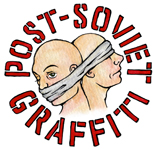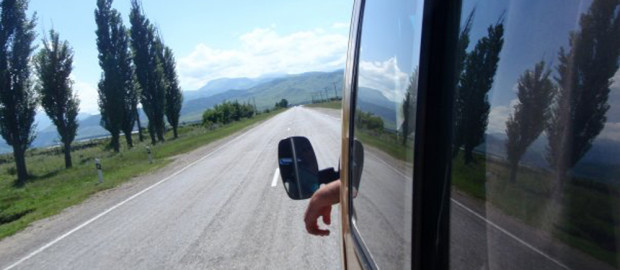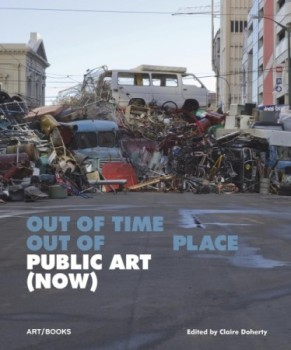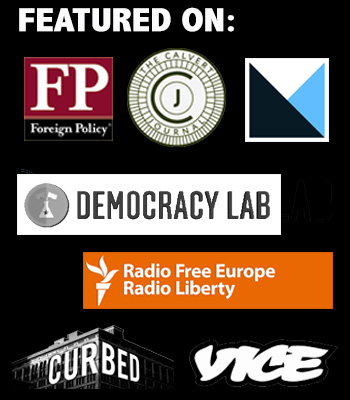On Valentine’s Day, the Russian authorities arrested a man named Asker Sokht. Sokht is a prominent member of the Circassian ethnic minority, many of whom are protesting the Olympic Games in Sochi, a city that is part of their ancestral homeland. What’s remarkable, though, is that Sokht isn’t one of those critics: He’s known among his fellow Circassians as relatively supportive of the Kremlin, and he hasn’t made any public statements opposing the Games. How he managed to awaken the ire of the authorities remains unclear. But his detention suggests that Moscow is taking no chances when it comes to one of the thorniest political controversies surrounding the games.
For Circassians, 2014 is a date fraught with unpleasant memories. One hundred and fifty years ago the Tsarist army finally triumphed in a century-long war with the Circassians and other rebellious peoples in the North Caucasus. The last Circassian fighters surrendered to the Tsar’s leading general in Krasnaya Polyana, the center of the Olympic alpine events. The Circassians had already paid dearly even before their final defeat. By one estimate, Russian troops exterminated 1.5 million ethnic Circassians between 1860 and 1864. Most of the survivors, starving and brutalized, were herded onto ships that carried them away to the Ottoman Empire, where they had to start new lives from scratch. Today, 7 million Circassians live scattered around the world; a mere 800,000 remain in Russia. Oliver Bullough, in his book Let Our Fame Be Great, describes the Tsar’s war against the Circassians as the first instance of modern European genocide. Yet the Kremlin — otherwise eager to embrace the legacy of Tsarist Russia whenever it has the chance — denies that the Circassian tragedy ever took place.
For many Circassians, the Olympic Games are merely another example of how their story has been whitewashed from history. Bullough notes that the helipad where visiting VIPs are welcomed has been built on the parade ground where the Tsar’s soldiers marched to celebrate their 1864 victory. So they’ve decided to use the Games to draw attention to the injustice. While members of some of the other Muslim ethnic groups in the region have taken up armed jihad as a way of expressing their opposition to the authorities, however, the Circassians — within Russia and without — have resolutely chosen the path of nonviolent resistance.
As Sokht’s case shows, that hasn’t spared them from the wrath of the authorities. On Feb. 7, dozens of Circassian activists converged on the town of Nalchik, some 200 miles east of Sochi, to stage a peaceful protest against the Games. The police responded quickly and harshly, dispersing the group and arresting at least 37.
FP‘s Alexis Zimberg spoke on the phone with Abubekir Murzakan, the leader of a Circassian civic group that took part in the Nalchik protests.
FP: Can you tell me a little bit about these protests?
AM: We were protesting against the Olympic Games, and the opening ceremonies in particular. The city of Sochi is a Circassian symbol. Why? Because Circassian fighters fought their last stand there. Sochi was also the last capital of free Circassia, the seat of our parliament. They drove all of our people into Sochi before sending them into exile. So many died there, from disease or hunger. Sochi is a symbol for the Circassian people.
So why the protest against the Olympics? There was nothing about the Circassians at the opening of the games, in the symbols or the ceremony. Any self-respecting person would have said that the Circassians lived here, that this was their territory. The Russians didn’t even say, “Yes, we fought with you. Yes, there was a war here. A tragedy, a catastrophe for this entire people happened here.” Nothing was said, not a thing. They said that Argonauts lived here, Cossacks, Armenians, Greeks. They didn’t manage to say a word about the Circassians. They ignored us.
FP: What sort of protest was it?
AM: The action was peaceful. I want to say to the international community that the Circassian problem will be decided only by peaceful means and within the rule of law. No one should take up arms. The strength of Russia and the strength of the Circassians aren’t comparable. Russia is stronger than we are. But just because they’re strong doesn’t mean they’re right. The Circassians have truth on their side; on its side, Russia has only force and lies. In the present age it is wrong to oppose force and lies with violence. Why? Because we have the international community, the United Nations, all the organizations that defend human rights, the rights of people. And we Circassians wish to live under the rule of law. We don’t want them to drive us out from under the rule of law. Why? Because you can’t frighten us with repression. You can kill us. You can arrest us. You can beat us up. You can do all that but you won’t be able to intimidate us. We’re for honesty, we’re for freedom, we’re for better mutual understanding among all the countries of the world, including Russia. Russia has drowned itself in lies. We don’t want lies. We want to see general knowledge of the genocide, general knowledge of our lands that were once called Circassia.
FP: Have you been coordinating your efforts with the Circassian diaspora?
AM: We do, but it’s hard. Often we no longer speak the same language. We don’t have the same backgrounds. 90 percent of Circassians live in the diaspora, in Turkey, in Jordan, in Palestine, in Syria, where they have many problems because of the war there. Russia closed the borders to our compatriots. For that reason we ask the international community to open the borders to other Circassians. We ask Russia to sit down at the negotiating table and talk about repatriation, about allowing language study in schools — to work out a road map, as they say nowadays. But we have nothing. So far no one wants to talk to us.
FP: Can you tell us more about what happened on the 7th?
AM: None of the people who participated in the demonstration were extremists. There were 10 cars with “No Sochi” banners and Circassian flags. There was also supposed to be a moment of silence in the town square. We would have stood there silently and then dispersed. The people in the cars with the flags and the banners were supposed to go through the city and all around the republic. But it didn’t happen that way. They were blocked by the police and then by the FSB and Interior Ministry troops, including special counterterrorism forces. Plus traffic police, who said that we were blocking traffic. When the police held us, they gave some of us jail sentences, said that we were obstructing law enforcement organs, blocking traffic and pedestrians, and holding an illegal meeting.
More than 30 people were taken to the police station. 27 were kept overnight, and six of them ended up staying in detention for several days.
FP: The reaction of the security forces was very harsh. Why do you think that they responded in this way?
AM: In Russia, protests against the authorities are not allowed. A dictatorship has already begun. There is no freedom of speech, no freedom of action. If you ask for official permission to demonstrate, the authorities will always say no.
[When they took us into the police station, I met] the Nalchik police chief. We had a very heated exchange because he was drunk. This protest was a red flag to the police.
They took my phone away and kept it for three hours. They took everyone’s phones. In some cases they searched the houses of the people who were detained. Four of the men were beaten very badly — one of them because he was taking video footage of the protest, the others for no apparent reason.
FP: I understand they tried to get you to make a confession?
AM: They always want to portray us as Islamic fundamentalists or terrorists. They asked us all sorts of questions about this and that. The gist of it was that they wanted to make us out to be extremists or nationalists. That’s what they wanted. But it didn’t work. We’re determined to stick to the principle of peaceful dialogue, with the authorities and everyone else. We insist on the rule of law. What we don’t accept is the lie. They want to transform our truth into lies.
By Alexis Zimberg and Christian Caryl. Originally published by Foreign Policy on February 19th, 2014.



![[VICE] The Silent Protest of Post-Soviet Graffiti](http://postsovietgraffiti.com/wp-content/uploads/2016/01/vice-1-140x90.jpg)





